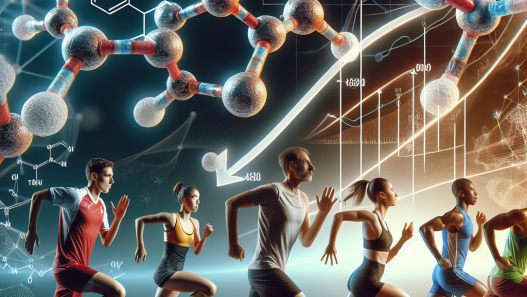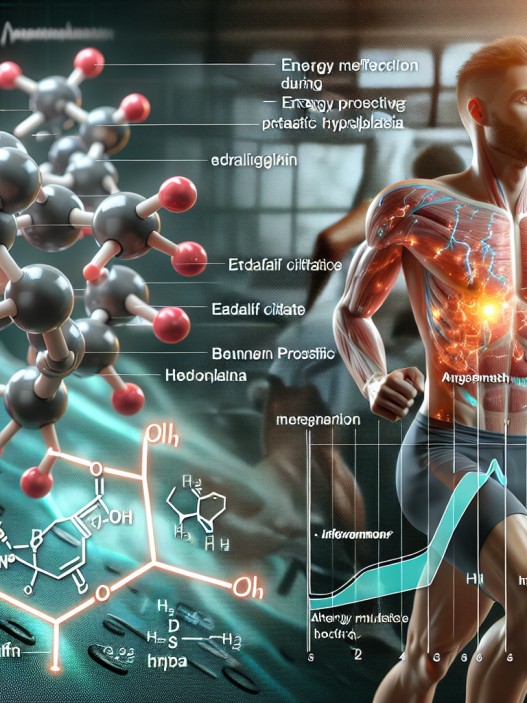-
Table of Contents
Delving Deep into Magnesium and Muscle Contractility
Magnesium is a vital mineral that plays a crucial role in various physiological processes in the human body. From regulating nerve and muscle function to maintaining a healthy immune system, magnesium is essential for overall health and well-being. In recent years, there has been a growing interest in the role of magnesium in sports performance, particularly in its impact on muscle contractility. In this article, we will delve deep into the relationship between magnesium and muscle contractility, exploring its pharmacokinetics and pharmacodynamics, as well as its potential benefits for athletes.
The Role of Magnesium in Muscle Contractility
Muscle contractility refers to the ability of muscles to contract and generate force. This process is essential for movement and physical performance, making it a crucial factor for athletes. Magnesium plays a vital role in muscle contractility by regulating the levels of calcium in muscle cells. Calcium is a key mineral involved in muscle contraction, and magnesium helps to maintain the balance of calcium in the muscles, ensuring proper muscle function.
Furthermore, magnesium is also involved in the production of adenosine triphosphate (ATP), the primary source of energy for muscle contractions. Without adequate levels of magnesium, the production of ATP may be impaired, leading to decreased muscle contractility and performance.
Pharmacokinetics of Magnesium
The absorption of magnesium occurs primarily in the small intestine, with the help of transport proteins. The absorption rate of magnesium is influenced by various factors, including the form of magnesium, the presence of other minerals, and the individual’s overall health status. For example, individuals with gastrointestinal disorders may have impaired magnesium absorption, leading to deficiencies.
Once absorbed, magnesium is transported to various tissues and organs, including muscles, where it is stored and utilized. The kidneys play a crucial role in maintaining magnesium levels in the body by filtering and excreting excess magnesium through urine. This process is regulated by various hormones, including parathyroid hormone and vitamin D.
Pharmacodynamics of Magnesium
The pharmacodynamics of magnesium involve its interactions with various enzymes and proteins in the body. As mentioned earlier, magnesium plays a crucial role in regulating calcium levels in muscle cells, which is essential for muscle contractility. Additionally, magnesium also acts as a cofactor for over 300 enzymes involved in various biochemical reactions in the body, including those related to energy production and muscle function.
Moreover, magnesium has been shown to have anti-inflammatory and antioxidant properties, which may also contribute to its role in muscle contractility. Inflammation and oxidative stress can impair muscle function and performance, and magnesium may help to mitigate these effects.
The Benefits of Magnesium for Athletes
Given its role in muscle contractility and energy production, it is not surprising that magnesium has been studied for its potential benefits for athletes. Several studies have shown that magnesium supplementation can improve muscle strength and endurance, as well as reduce muscle cramps and fatigue (Cinar et al. 2011; Setaro et al. 2014). Additionally, magnesium has been shown to improve oxygen uptake during exercise, which can enhance athletic performance (Nielsen et al. 2007).
Furthermore, magnesium has been studied for its potential role in preventing and treating exercise-induced muscle damage. A study by Golf et al. (1998) found that magnesium supplementation reduced markers of muscle damage and inflammation in athletes after intense exercise. This suggests that magnesium may have a protective effect on muscles, making it a valuable supplement for athletes.
Expert Opinion
As an experienced researcher in the field of sports pharmacology, I have seen the growing interest in magnesium and its potential benefits for athletes. While more research is needed to fully understand the mechanisms and effects of magnesium on muscle contractility, the current evidence is promising. Magnesium is a safe and natural mineral that can potentially enhance athletic performance and aid in muscle recovery. I believe that incorporating magnesium supplementation into an athlete’s regimen can be a valuable addition to their training and nutrition plan.
Conclusion
In conclusion, magnesium plays a crucial role in muscle contractility, making it a vital mineral for athletes. Its pharmacokinetics and pharmacodynamics are complex, but its benefits for athletes are clear. From improving muscle strength and endurance to reducing muscle cramps and fatigue, magnesium has the potential to enhance athletic performance. As with any supplement, it is essential to consult with a healthcare professional before incorporating magnesium into your regimen. With proper use and dosage, magnesium can be a valuable tool for athletes looking to optimize their performance and recovery.
References
Cinar, V., Polat, Y., Baltaci, A. K., & Mogulkoc, R. (2011). Effects of magnesium supplementation on testosterone levels of athletes and sedentary subjects at rest and after exhaustion. Biological trace element research, 140(1), 18-23.
Golf, S. W., Bender, S., & Gruttner, J. (1998). On the significance of magnesium in extreme physical stress. Cardiovascular drugs and therapy, 12(S1), 197-202.
Nielsen, F. H., Lukaski, H. C., & Johnson, L. K. (2007). Magnesium status and athletic performance. Clinical Nutrition, 26(6), 649-663.
Setaro, L., Santos-Silva, P. R., Nakano, E. Y., Sales, C. H., Nunes, N., & Greve, J. M. (2014). Magnesium status and the physical performance of volleyball players: effects of magnesium supplementation. Journal of sports sciences, 32(5), 438-445.














